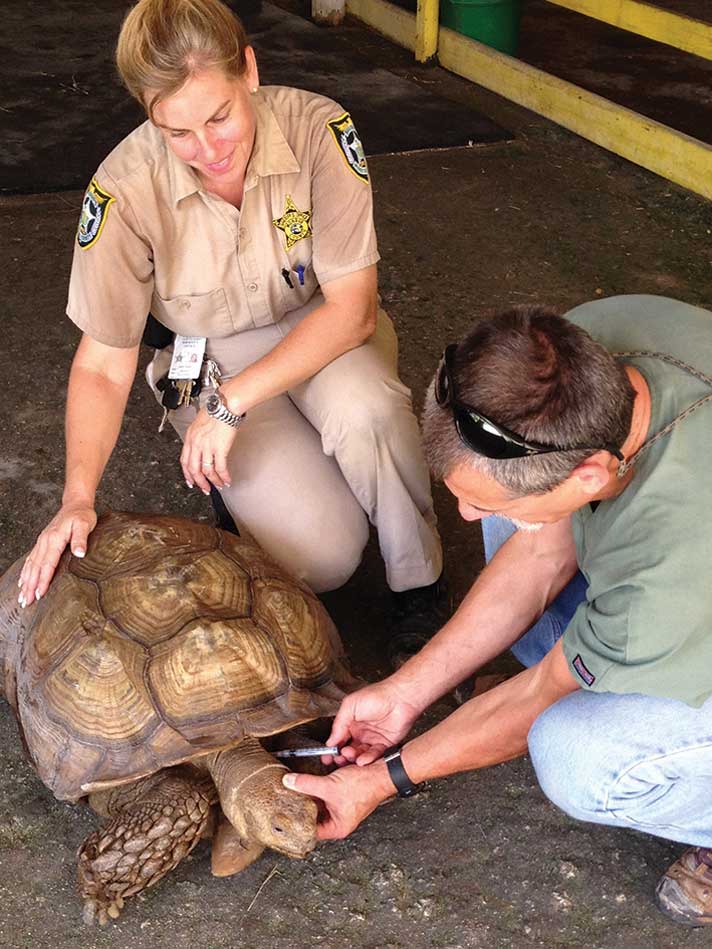The Monroe County Jail in Florida is home to a variety of animals, cared for by inmates.
Nestled under a Spartan concrete building at the end of Hemmingway’s Islands in the Stream, you’ll find a most unusual collection of critters, all within the confines of the county’s foremost correctional facility: Monroe County Jail.

douglas mader
The Monroe County Jail in Florida is home to a variety of animals, cared for by inmates.
Surrounded by 20-foot-tall fences, adorned with coiled razor wire, are Patagonian cavies, horses, pigs, sheep, goats, many species of birds, various small mammals, an emu named Kramer and a dozen poikilotherms—frogs, toads, turtles, tortoises, gators, lizards and snakes.
The Monroe County Sheriff’s Animal Farm, the only one of its kind in North America, is wholly confined within the grounds of the jail, and with the exception of the farm supervisor, fully staffed by inmates wearing bright-orange jumpsuits.
Started in 1994, this licensed USDA zoo was initially a refuge for wayward ducks that had plagued a nearby golf course and hit by cars. The fowl were rounded up by a contingency of inmates and temporarily housed in an enclosed area under the shelter of the elevated jail. Thus, the Muscovy ducks and assorted chickens were the first “inmates” of the nascent zoo. Shortly afterwards, the SPCA from Miami, about three hours away, called and asked if the facility would take in a blind horse they had found abandoned. Using inmate labor, a stall and pen were built, and the first mammal called the jail “home.”
Over the years, the reputation of the farm grew, not for being a tourist attraction like the San Diego Zoo or Disney, but for its willingness to take in and care for any wayward critter. With the exception of the cavies, all the animals residing on the farm were abandoned, abused, confiscated or donated.
A former Sheriff’s office employee went to a livestock auction several years back. While there, she found a pair of Patagonian cavies, large rodents from South America, on the auction block—to be sold either as food or “bait” animals used to train hunting dogs. She felt sorry for them, bought them with her own money and brought them back to the farm. The big rodents loved living in the jail and made romance a big part of their life—eventually propagating into a “herd” of cavies.
While the animal park hosts between 250 to 300 animals at any time, some of the more unique stories evolved around the reptile collection. Fat Albert, a 130-pound African spur tortoise, was found wandering around the parking lot at the Holiday Inn in Key West. How do you lose a 130-pound tortoise? And who takes one on vacation with them?
Irwin, one of the farm’s alligators, was donated by Dr. Kevin Fitzgerald of Animal Planet fame. He rescued the reptile from a crack house where several others had already been made into hat bands and belts. Dr. Fitzgerald personally flew the crocodilian to the farm, where it now lives in a beautiful outdoor enclosure with a pond in the Florida sunshine.
Want To Learn More?
Federal Lawsuit Targets Police Use of Burmese Python in Alabama Jail
Freedom Frog Released From Pennsylvania Prison
Ghost, a 12-foot-long albino Burmese python was rescued from the back of a station wagon, where it lived with two dogs, a raccoon, a macaw, a chicken, several iguanas and another large constrictor. The owner of the menagerie had visions of taking his charges down to the famous Sunset Pier at Mallory Square to have photos taken with willing tourists.
When animal control discovered the terrestrial ark, all the animals were confiscated, taken to the farm and the owner arrested on animal cruelty charges. Sadly, Ghost and the other constrictor died from a paramyxovirus infection shortly after they were confiscated. Years later, a new star herp, Pink, a 13-foot-long albino Burmerse, was donated when she grew too large for the owner to keep.
The farm is only open to the public on the second and fourth Sunday of each month, but it is available for private group tours. It’s funded largely by donations. Regardless of the tight budget, all the animals get regular veterinary care.
I make monthly veterinary rounds to the farm with my senior veterinary students and discuss the biology, husbandry and veterinary care of the animal inhabitants. When I do, the caretaker inmates join in the lessons and also participate with any animal interventions that I am involved with. This opportunity gives not only my students excellent exposure to exotic animals, but also teaches the inmates new skills and helps guide them in directions that may just one day help keep them from coming back. After all, not many people look good in orange.
Douglas R. MADER, MS, DVM, DABVP (REPTILE/AMPHIBIAN), is a graduate of the University of California, Davis. He owns the Marathon Veterinary Hospital in the Conch Republic, and is a world-renowned lecturer, author and editor. He sits on the review boards of several scientific and veterinary journals.


